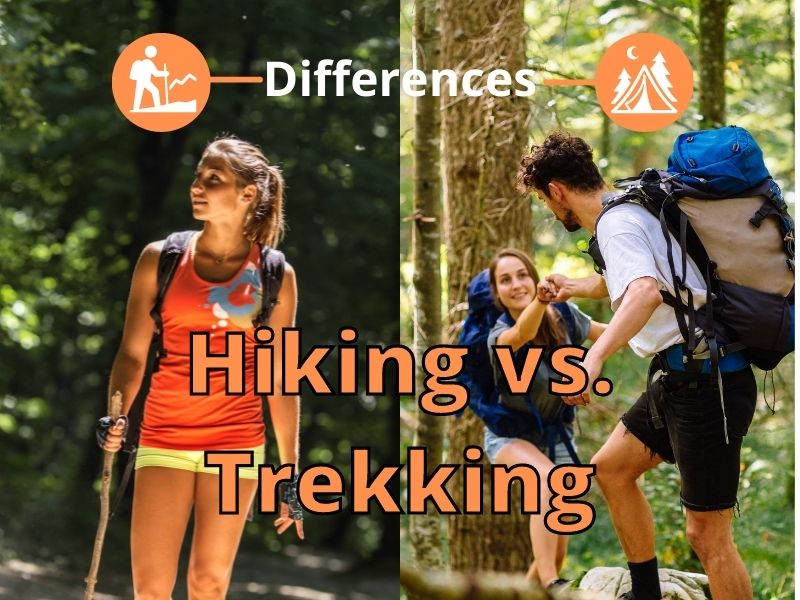When I go for a hike it’s usually for a couple of hours and only lasts one day. That doesn’t mean a hike can’t last longer than one day, but it usually doesn’t last too long. When I went on longer journeys over many days, this could be consider trekking because you’re gone for a longer period, sometimes over vast distances.
A hike is defined as a long walk on a trail while a trek is a long difficult journey on whatever path is available. Hiking is used on overnight camping trips and trekking is usually used for traveling from point A to point B taking days to weeks. Normally, light gear is needed for hiking, and trekking requires you to pack everything needed you to capably walk and camp in the wilderness.
Both hiking and trekking can be fun and provide a once-in-a-lifetime experience. I enjoy going camping and hiking but haven’t been trekking since I was a teen. I look forward to going on a trek in the future and once again enjoying the great outdoors for an extended time.
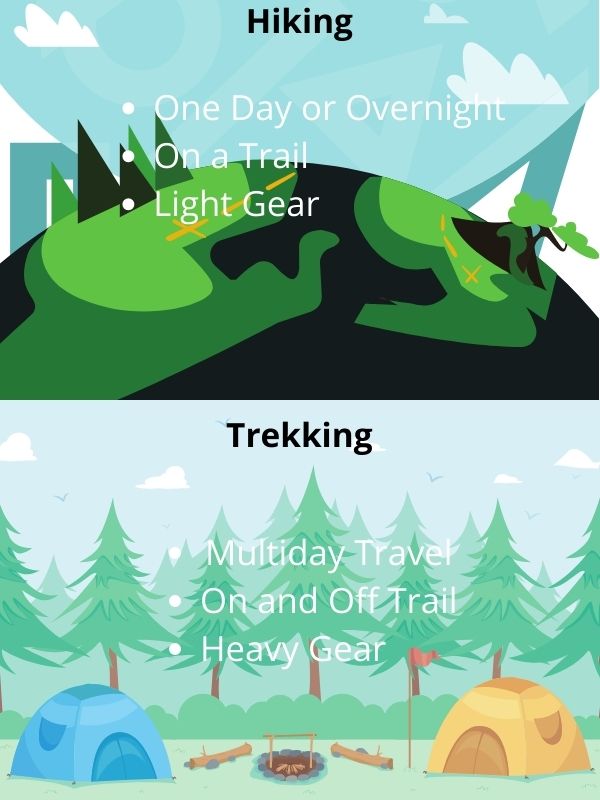
For the past couple of years, I have been on many 30 minutes to 3-hour hikes in the area that I live in. It’s been a great experience to visit new places and explore the area.
Hiking is seen by most people as any type of travel in a wilderness setting. It’s ok to use the term “hiking” most of the time but to clarify if someone is taking a long journey we should specify their travel as “trekking” most of the time.
Sometimes I get the urge to go on a trek for a week or longer. This would involve a lot more planning and preparedness. A hike on the other hand is simple to plan for because it’s short-term.
While you can go camping (set up a tent and rest area) on a hike and a trek, there are some differences that make each one distinct. The main difference that I see is that a hike will likely last one day and then you stop at home or a hostel, while a trek requires you to take care of yourself independent of outside help most of the time.
Both hiking and trekking are similar, so let’s find out how they are each unique and when you might be required to use one versus the other.
When Hiking is Required?
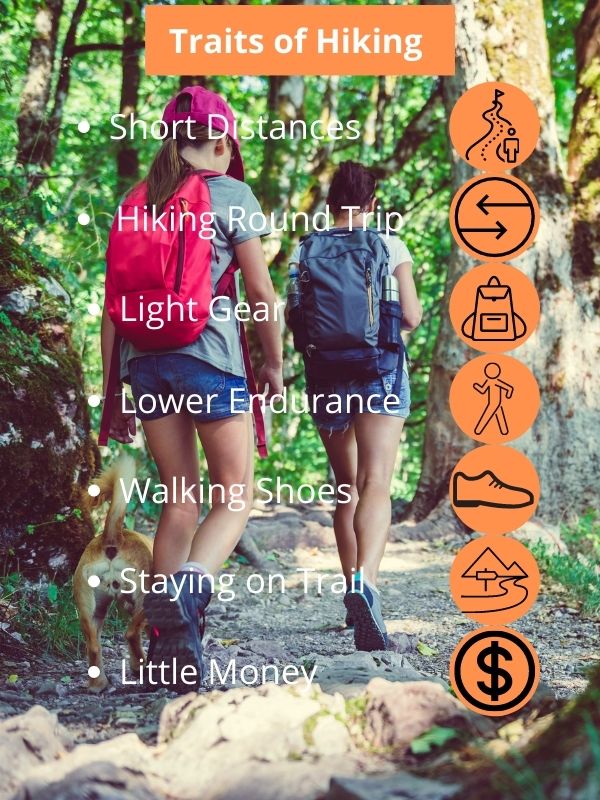
I love to go out for a hike, especially when it’s to a place that I’ve never been to before. I’m always surprised at the beautiful places all around right next to the city. If you go hiking, what is one of your favorite parts of this experience? Mine is being alone without any sounds or people in a natural environment.
Hiking is required:
- To travel for short walks to all-day walks that bring the hiker back to the beginning of the trail.
- A hiking trail usually guides the hiker on a loop or two-way path that is walked in a day or less.
- To get to a camping destination and back.
- When your camping for the weekend you will hike your gear into the camping location and back to the start when you’re done.
- When you don’t have much gear or are not prepared for many days out on the trail.
- Some people bring a lot of stuff when camping, and it’s usually fine when hiking short distances. If you want to travel comfortably for longer periods (trekking) then you need the right gear that is light, yet meets all your needs.
- When you don’t have a lot of experience walking with a backpack for long distances.
- Having endurance is usually required to travel many days in a row. Camping locations may be 10-20 miles apart and experience is required to continue walking without injury or loss of strength.
- When you have walking shoes or other shoe types that aren’t meant for many days on the trail.
- Most comfortable sports shoes or walking shoes will work for a day hike. You might need a hiking shoe is the terrain is rough, steep, and rocky, but they’re not always required.
- When you want or need to stay on a trail.
- Hiking is meant to take you on a path that you follow, while trekking isn’t always on one. You’ll usually be on a dirt trail that leads through brush and trees into a more wilderness-type area.
- When you don’t have money saved up for long trips.
- A hike doesn’t usually cost any money, although you might want to invest in some hiking poles if you are climbing steeper hills to save your knees.
Going on a hike usually means there is a distinct trail/path that is not used for other types of access such as for motor vehicles. You do find some hiking paths that are shared with mountain bikes, but they are generally used by either hikers or bikers.
When Trekking is Required?
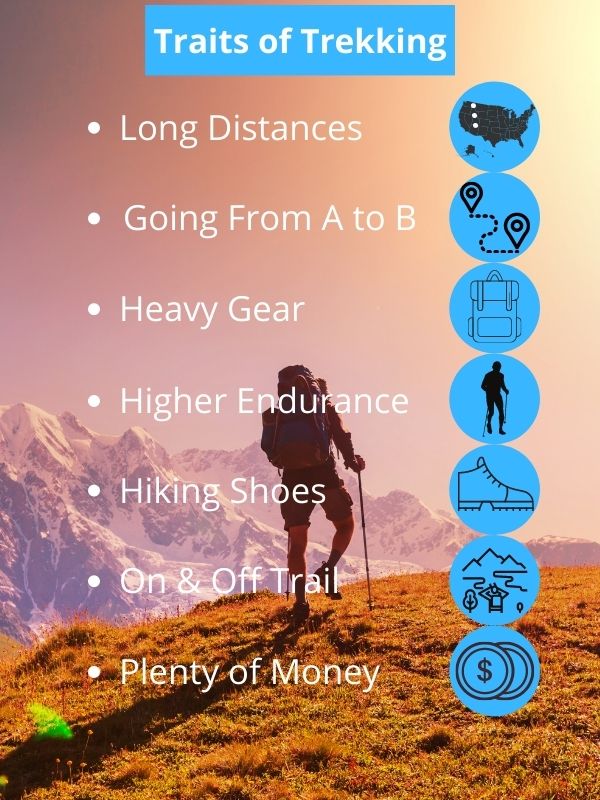
Going on a long trip while backpacking usually requires you to trek your way through various trails, roads, and terrain to get to your destination. I have considered going on the PCT (Pacific Coast Trail) for a couple of weeks. I think this would be a good trekking experience.
Trekking is required:
- To travel for long periods of time each day, such as 10 – 30 miles.
- You’ll likely find that you will walk around 6-10 hours each day for many days in a row. If trekking for several weeks you should take a break from walking at least a day or two each week for joint health and recovery.
- To get to travel across great distances.
- You will usually travel from point A to point B when trekking, instead of a loop. You’ll likely get a car or plane ride back to your original destination.
- When going to areas where most vehicles can’t gain access.
- I have been on hiking trails that trucks can easily access, but when trekking you likely won’t have access to any vehicle besides a helicopter if there’s an emergency.
- When you have experience walking over many types of terrain and can walk with a fairly heavy backpack for long distances.
- You need leg strength and endurance to travel for many days in a row. You need your gear to set up camp when done walking for the day.
- When Your Have hiking shoe or trail running shoes that are meant to last for long periods on the trail.
- Most hiking shoes provide good support, can take a lot of abuse, and do a lot of the work that your foot would normally do. Some people prefer trail running shoes because they are light, but you’ll need strong feet to go long distances because trail runners may not be as supportive.
- When you want to see it all.
- Trekking is meant to allow you to climb mountains, traverse dense foliage, and go where you want to. Sometimes you no longer see a trail, but you still can get to your destination.
- When you have saved enough money for a longer trip.
- A trek can take a while. Depending on what your plans are you’ll need to budget enough money for all the expenses. Some people who traveled on the PCT (Pacific Coast Trail) spent “from $5,000 to more than $10,000.” (rei.com) This takes about 5 months of traveling, but most people won’t do this, so it would be much less for most people.
How Are They The Same?
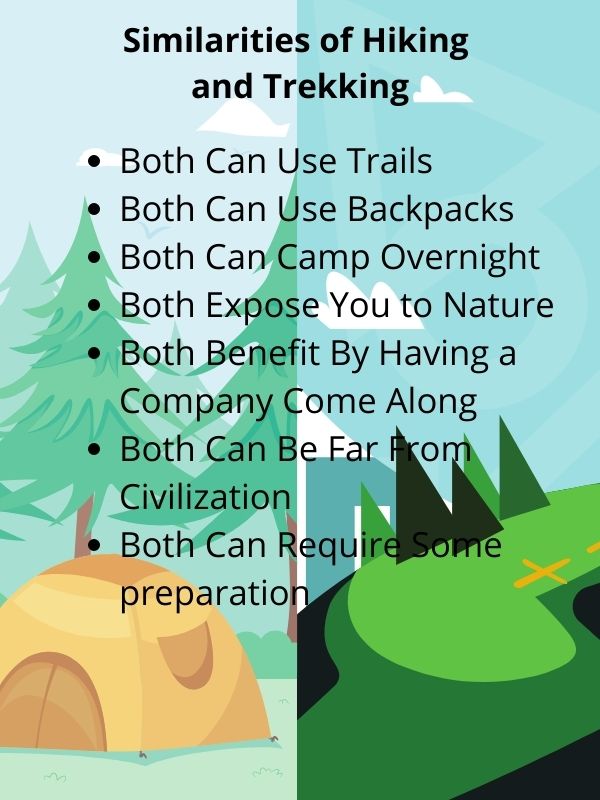
When you go walking into nature for a while you are sharing the same experience that hikers, backpackers, trekkers, and mountaineers are experiencing. You are going to an area that is mostly surrounded by nature and is away from the views and sounds of people and places.
Some of the common attributes that hiking and trekking are the following:
- You will almost always be using a trail at some time when on either a hike or trek.
- You are likely to carry a backpack during both, even if your hiking backpack only carries water and some Band-Aids.
- You can camp overnight when going for a hike and during a trek.
- You will most likely be immersed in nature when you hike or trek. It should be different than going to a park where you are likely able to hear the sound of the city.
- You often will take a companion with you when hiking or trekking. This is helpful for safety and during emergencies.
- You may be far from any amenities, such as food and water during a hike and trek.
- You may need to plan and get supplies to be ready for both a hike and a trek.
Both hiking and trekking can be a positive and uplifting experience if you know what you’re getting yourself into. Being prepared is always helpful and the more you hike the more you’ll be ready for a trek out for many days in nature.
How Are They Different?
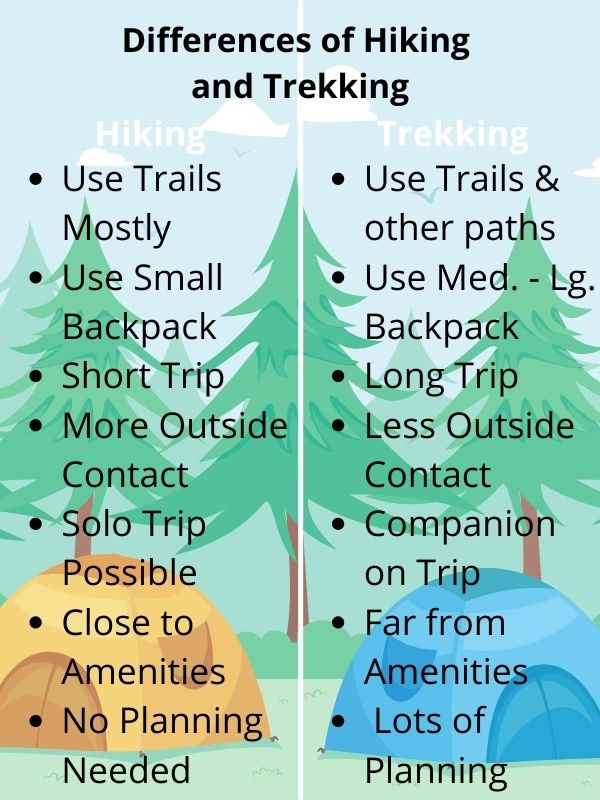
When you go on a multiday trek around the forest and mountains, your experience will be different from doing a day hike. You may go from feeling uncomfortable to feeling great when out for long periods, while on a day hike you know you will go back to the comforts of home soon.
As you are immersed in nature for different time periods and different levels of difficulty, your experience may be in large part due to your attitude. We are creatures of habit and when we are far away from the comforts of our normal life, we tend to have varying levels of positive and negative experiences.
Some of the attributes that differentiate hiking and trekking are the following:
- On a trek, you will almost always go off-trail at some point but less so when hiking.
- On a trek, you are likely to carry a medium to large backpack, but day hikers use smaller-sized packs that weigh much less.
- On a trek, you camp for many nights to many weeks in a row, while hikers may or may not camp for a day.
- On a trek, you will most likely be immersed in nature with no contact with the outside world for days on end, while hiking tends to take you away from the outside world only for hours at a time.
- On a trek, you often take a companion for safety and help because help may be days away, but hiking can be done by yourself with a greater chance of getting more immediate help.
- On a trek, you will stop into town maybe once a week for necessities, but on a hike, amenities are usually close by.
- On a trek, you will need to plan weeks to months ahead of time but a hike may not take any planning at all.
If you want to go on a trek, it’s a very good idea to do a lot of short hikes and overnighters to get used to what you can expect to experience while cut off from the world for periods of time. I agree that trekking can be a great experience, but it can be challenging as well.
Final Thoughts
If you are feeling the call of nature, what will be your approach to getting out in the wild? There are so many options available. It’s always good to be prepared for any situation, so I like to carry enough supplies to last me for many hours when I go on a hike, even if I was only planning for 1 or 2.
Finding yourself out in nature may inspire you to stay longer and explore more. Other times you look forward to the comforts you are used to. Whatever you plan to do with your next hike or trek, I hope you can have a rewarding experience and take in the rich environment that nature provides in whatever climate and location you find yourself.
Thanks for visiting Helpshoe.com
References
https://adventures.com/blog/hiking-vs-trekking/
https://www.muchbetteradventures.com/magazine/hiking-vs-trekking-whats-the-difference/
https://monkeysandmountains.com/hiking-trekking-mountaineering/
https://www.mountainguides.is/blog/the-great-mystery-whats-the-difference-between-hiking
https://skilledadventurer.com/differences-between-hiking-trekking (Update: Article no longer available)

